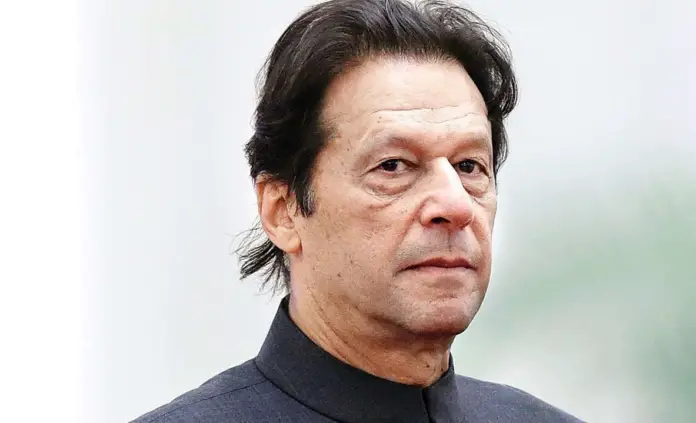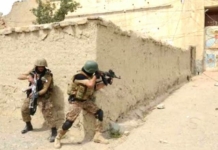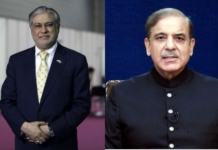Prime Minister Imran Khan has said that he would not accept the ‘imported government’ if it came to power, and that he was being removed in favour of a government that would be more accommodating to foreign powers.
In his address, the premier spoke about the Supreme Court’s ruling, the sovereignty of the country, the ‘foreign threat’, corruption and horsetrading, no-confidence motion, and the foreign policy that the country should have.
While referring to the new government that would possibly come after the no-confidence vote as an ‘imported government’, the premier said he would protest against it and urged his supporters to come out on Sunday against the new government.
The premier said that the opposition powers, who had united, only wanted to have corruption cases against them dismissed.
He added that they were also against electronic voting machines, voting rights for overseas Pakistanis, and they [the opposition] could never win with a neutral umpire.
The prime minister added that if the opposition was so concerned about democracy, they should go for elections.
The premier said that if the nation didn’t take a stand on the recent attack on our sovereignty, no ruler in the future would be able to rule freely.
He added that the nation should stand up for an independent foreign policy, further saying that the country wanted a foreign policy where it was not part of any conflict.
He said that foreign powers appreciated those who said things like ‘beggars can’t be choosers’.
The premier, while speaking about the War on Terror, said that no one had ever appreciated Pakistan’s role in the war.
Prime Minister Imran Khan said that foreign powers wanted him removed because he had spoken against drone attacks, protested against the Iraq War, and that he could not be controlled as he was an honest person.
The premier talked about the ‘foreign threat’, and said that a foreign state official met the ambassador of Pakistan, who said that Prime Minister Imran Khan should not have gone to Russia.
The premier said that the official stated that if the no-confidence motion failed, it would have disastrous consequences for Pakistan, and if he succeeded, then Pakistan would be forgiven.
He said that it was disheartening that a nation of 220 million was being threatened like this.
He added that following this ‘threat’, the PTI started losing its members.
The premier said that the party got to know that American diplomats started meetings with our members following the interaction in which the threat was made.
While speaking about the cable received from the United States, he said that it was not made public as the world would get to know of the encryption through which such cables were sent.
The prime minister said that it was the responsibility of the nation to take steps against evil, citing the example of the protests in United Kingdom against the Iraq War.
The premier also stated that the Supreme Court should have taken suo motu notice of the horsetrading going on.
He added that politics had degenerated since the horsetrading that the Sharifs engaged in in the 1990s.
“I have never witnessed such a thing [horsetrading] in the west,” the premier continued.
The prime minister said that he wished that the Supreme Court should have probed the foreign threat made through the letter, which it did not do.
The prime minister began his speech by saying that he wished to speak about sovereignty.
He stated that he was dejected by the decision of the Supreme Court, but he respected the apex court and the judiciary and accepted the decision.
The address comes following Supreme Court’s ruling on Thursday wherein it dismissed National Assembly Deputy Speaker Qasim Suri’s ruling to reject the no-confidence motion against Prime Minister Imran Khan.
The decision of the Supreme Court was a unanimous ruling by the five-member bench, which declared National Assembly Deputy Speaker Qasim Suri’s ruling to reject the no-confidence motion against Prime Minister Imran Khan as unconstitutional.
The Supreme Court has also declared the subsequent dissolution of the National Assembly by the president as unconstitutional, and that the prime minister was not in the legal right to write a letter to the president.
The Supreme Court also declared the advice to the president for dissolution of the National Assembly as unconstitutional.
The apex court has nullified all the decisions made till date since the NA deputy speaker’s ruling.
The Supreme Court has ordered National Assembly Speaker Asad Qaiser to call a session of the National Assembly on April 9 for voting on the no-confidence motion against Prime Minister Imran Khan.
The court further stated that if the no-confidence motion succeeded, then the assembly would appoint a new prime minister.
The Supreme Court had been hearing the case since a suo motu notice taken by Chief Justice Umar Bandial on Sunday after the NA deputy speaker dismissed the no-confidence motion against the premier and the president dissolved the federal legislature.
On Sunday, President Dr. Arif Alvi had dissolved the National Assembly following a request by Prime Minister Imran Khan.
The premier had stated in an address following the National Assembly’s dissolution that he had requested the president to dissolve the assembly and go for elections in the country.
The dissolution of the National Assembly came after National Assembly Deputy Speaker Qasim Suri rejected the no-confidence motion against Prime Minister Imran Khan on Sunday morning.
The no-confidence motion had been tabled by Leader of the Opposition in the National Assembly Shehbaz Sharif on March 28.







